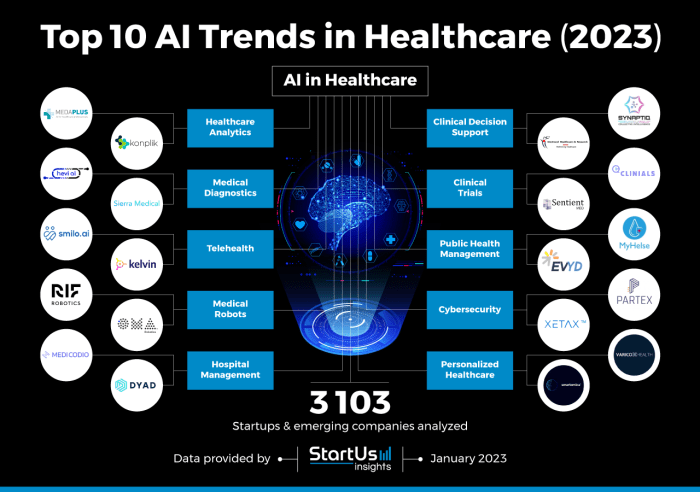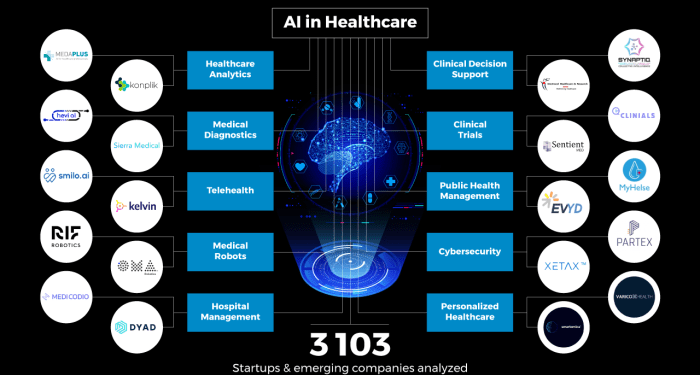In the fast-evolving landscape of healthcare, the integration of Conversational AI platforms is set to redefine patient care and operational efficiency by 2025. This article delves into the top 5 Healthcare Conversational AI Platforms that are poised to lead this transformative journey, offering a glimpse into the future of healthcare interactions.
Overview of Healthcare Conversational AI Platforms
Conversational AI in healthcare refers to the use of artificial intelligence technology to enable natural language interactions between patients, healthcare providers, and healthcare systems. This technology allows for automated communication through chatbots, virtual assistants, and voice recognition systems, providing a more seamless and personalized experience for users.AI platforms play a crucial role in improving patient care and operational efficiency in healthcare settings.
By leveraging machine learning algorithms and natural language processing, these platforms can assist in appointment scheduling, symptom assessment, medication reminders, and patient education. This not only helps healthcare providers deliver timely and accurate care but also streamlines administrative tasks, reducing the burden on staff and improving overall workflow efficiency.The significance of Conversational AI in transforming the healthcare industry by 2025 is immense.
With the growing demand for accessible and cost-effective healthcare services, AI platforms can help bridge the gap by offering 24/7 support, personalized recommendations, and remote monitoring capabilities. This shift towards AI-powered solutions is expected to enhance patient engagement, improve health outcomes, and drive innovation in the way healthcare services are delivered and managed.
Key Features and Capabilities of Top Healthcare Conversational AI Platforms
In 2025, the healthcare industry is expected to be dominated by five top Healthcare Conversational AI platforms, each offering unique features and capabilities for healthcare providers and patients.
Platform 1: AI Health
- Advanced Natural Language Processing (NLP) for accurate patient interactions.
- Robust data security measures to ensure patient confidentiality.
- High interoperability with existing healthcare systems for seamless integration.
- Scalability to handle a large volume of patient queries and data.
Platform 2: Medibot
- Personalized patient care recommendations based on AI-driven analysis.
- End-to-end encryption for secure communication between patients and providers.
- Interoperability with electronic health records (EHR) for comprehensive patient information.
- Scalable architecture to meet the growing demands of healthcare organizations.
Platform 3: HealthAI Assist
- Conversational AI for appointment scheduling and medication reminders.
- Role-based access control for data security and privacy compliance.
- Interoperability with telehealth platforms for virtual consultations.
- Scalable infrastructure to support multi-channel patient engagement.
Platform 4: CareBot+
- AI-powered triage for urgent care services and symptom assessment.
- Data encryption at rest and in transit for secure data exchange.
- Integration with Internet of Things (IoT) devices for remote monitoring.
- Scalable architecture for handling peak patient loads during emergencies.
Platform 5: MediAssist
- Virtual health assistants for personalized health recommendations and support.
- Blockchain technology for immutable patient health records and data security.
- API integrations for interoperability with external healthcare applications.
- Cloud-based infrastructure for seamless scalability and performance optimization.
Integration with Electronic Health Records (EHR) Systems

Integrating healthcare conversational AI platforms with Electronic Health Records (EHR) systems is crucial for improving patient care and streamlining workflows for healthcare professionals.
Benefits of Seamless Integration
Seamless integration between Conversational AI platforms and EHR systems offers several benefits for healthcare professionals:
- Efficient Access to Patient Information: Healthcare providers can quickly access patient records, treatment history, lab results, and other essential data through the AI platform, enhancing decision-making and care delivery.
- Personalized Care Delivery: By integrating with EHR systems, Conversational AI platforms can provide personalized recommendations, reminders, and follow-up care instructions based on individual patient profiles and medical history.
- Improved Coordination and Communication: Seamless integration facilitates better coordination among healthcare teams by enabling real-time access to updated patient information, reducing errors, and enhancing collaboration.
Challenges and Solutions
While integrating EHR systems with Conversational AI platforms offers numerous benefits, it also poses challenges that need to be addressed:
- Data Security and Privacy Concerns: Ensuring the confidentiality and security of patient data is essential when integrating AI platforms with EHR systems. Implementing robust encryption, access controls, and compliance measures can help mitigate these risks.
- Interoperability Issues: Compatibility issues between different EHR systems and AI platforms can hinder seamless integration. Developing standardized protocols, APIs, and data exchange formats can facilitate interoperability and data sharing.
- User Training and Adoption: Healthcare professionals may require training to effectively use AI-powered tools integrated with EHR systems. Providing comprehensive training programs and user-friendly interfaces can enhance adoption and utilization.
Patient Engagement and Support
Patient engagement and support are crucial aspects of healthcare that can significantly impact patient outcomes and satisfaction. Conversational AI platforms play a vital role in enhancing these areas by providing patients with easy access to information, assistance, and appointment scheduling.
Enhanced Access to Medical Information
Conversational AI platforms enable patients to access medical information quickly and conveniently. By simply interacting with a chatbot or virtual assistant, patients can inquire about their health conditions, medications, treatment options, and more. This instant access to information empowers patients to take control of their health and make informed decisions.
Appointment Scheduling and Reminders
One of the key features of healthcare conversational AI platforms is the ability to help patients schedule appointments seamlessly. Patients can book appointments, reschedule, or cancel them through these platforms, reducing the burden on administrative staff and streamlining the process.
Additionally, AI-powered reminders can help patients stay on track with their appointments, leading to improved adherence to treatment plans.
Real-Time Assistance and Support
Conversational AI platforms offer real-time assistance to patients, addressing their queries and concerns promptly. Whether it's answering medical questions, providing guidance on post-treatment care, or offering emotional support, these platforms ensure that patients receive the help they need when they need it.
This personalized support can enhance patient satisfaction and overall experience with healthcare providers.
Impact on Healthcare Outcomes
Improved patient engagement through conversational AI platforms has a direct impact on healthcare outcomes. Engaged patients are more likely to adhere to treatment plans, follow up with appointments, and actively participate in their care. This, in turn, can lead to better health outcomes, reduced hospital readmissions, and overall cost savings for healthcare providers.
By leveraging AI technology to enhance patient engagement and support, healthcare organizations can achieve better results and higher patient satisfaction levels.
Future Trends and Innovations in Healthcare Conversational AI
The field of Healthcare Conversational AI is constantly evolving, and beyond 2025, we can expect to see several advancements that will revolutionize the way healthcare interactions are conducted.
Voice Recognition Technology
Voice recognition technology is expected to play a significant role in the future of Healthcare Conversational AI. This technology will enable more seamless and natural interactions between patients and AI platforms, allowing for hands-free communication and improved accessibility for individuals with disabilities.
Sentiment Analysis
Sentiment analysis will also be a key innovation in Healthcare Conversational AI platforms. By analyzing the tone and emotions in a patient's voice or text input, AI systems can better understand the patient's needs and provide more personalized and empathetic responses.
This will enhance the overall patient experience and increase patient satisfaction.
Virtual Health Assistants
The integration of virtual health assistants into Healthcare Conversational AI platforms will further enhance the capabilities of these systems. Virtual health assistants can provide real-time support, reminders for medication intake, appointment scheduling, and even conduct preliminary assessments of a patient's condition.
This proactive approach to healthcare management will improve patient outcomes and streamline the healthcare delivery process.
Challenges and Ethical Considerations
Despite the numerous benefits that Healthcare Conversational AI platforms offer, there are also challenges and ethical considerations that need to be addressed. Ensuring patient data privacy and security, maintaining transparency in AI decision-making processes, and avoiding bias in algorithms are some of the key ethical considerations that must be carefully managed.
Additionally, there may be concerns regarding the overreliance on AI systems and the potential dehumanization of healthcare interactions.
Ending Remarks
As we conclude our exploration of the Top 5 Healthcare Conversational AI Platforms in 2025, it becomes evident that the intersection of technology and healthcare holds immense promise for improving patient outcomes and revolutionizing the industry as we know it.
Embracing these innovative solutions is not just a choice but a necessity in shaping a more efficient and patient-centric healthcare ecosystem.
FAQ
How do these AI platforms benefit healthcare providers?
These platforms enhance operational efficiency by automating routine tasks, enabling better patient management, and improving overall care quality.
Are these platforms equipped to handle sensitive patient data securely?
Yes, the platforms prioritize data security with robust encryption protocols and compliance measures to safeguard patient information.
Can patients interact with these platforms in multiple languages?
Most platforms support multilingual capabilities, allowing patients to engage in their preferred language for a more personalized experience.
Do these platforms require extensive training to use?
Not necessarily. The platforms are designed with user-friendly interfaces and intuitive functionalities to ensure seamless integration and ease of use for healthcare professionals.



